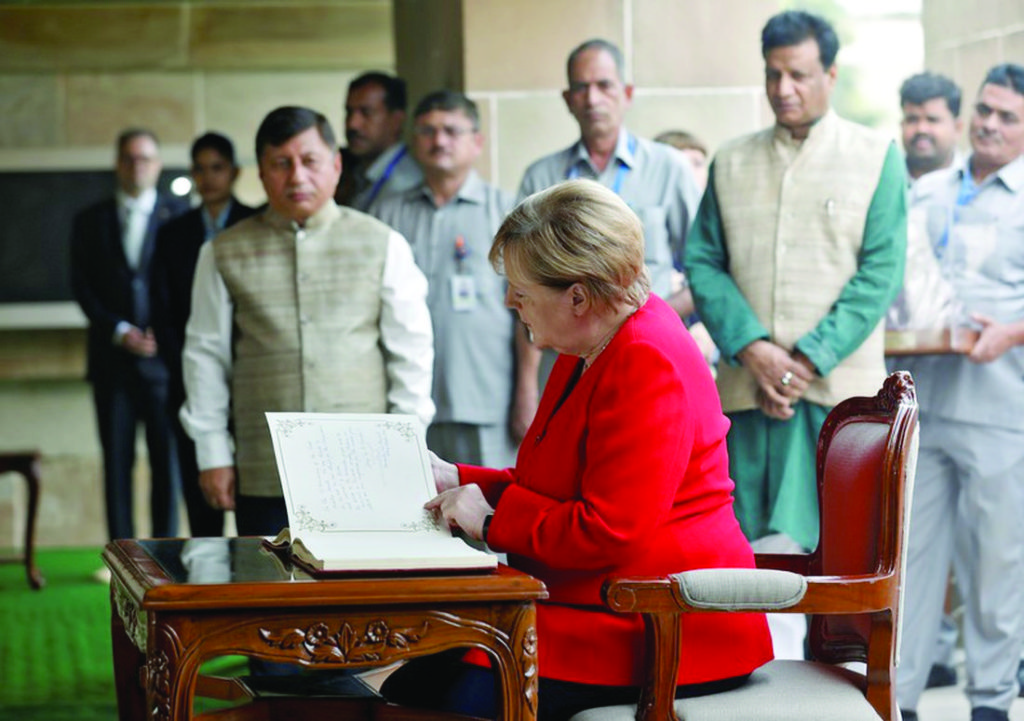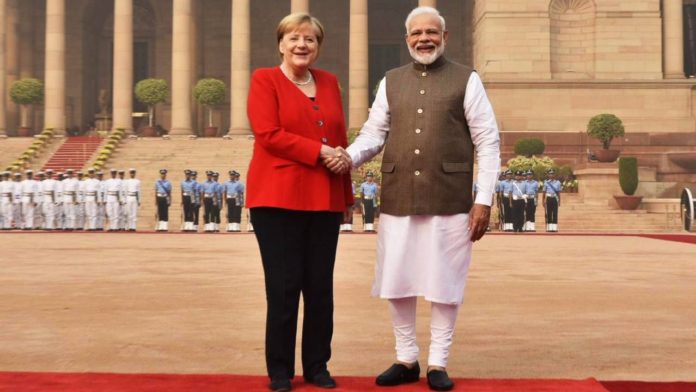The recent visit of Angela Merkel, German Chancellor, to India improved the German Indian bilateral ties in various fields. Indian Prime Minister, Narendra Modi, welcomed the German Chancellor on her two days visit and treated her to a military parade in the capital city. This meeting of German Indian states authorities widened the traditional foundations of bilateralism between two countries. An updated format of bilateral and multilateral collaborations started covering the areas of agriculture development, maritime technology and cultural cooperation. The present wave of collaboration between two countries let the Modi government promote Hindu culture in Germany though advancing the notions of Ayurveda, Yoga and Meditation. The promotion of Hindu cultural values in the European continent through Germany will let New Delhi promote Indian soft image across the world. The German Chancellor agreed for enhancing diplomatic connections in the areas of Ayurveda (Conventional Hindu traditions of medical treatments), Yoga (a combination of physical and spiritual practices) and Meditation (the mindful exercises of the body). An improvement in the bilateral engagement of two countries concluded a Memorandum of Understanding (MoU) for the extension of collaboration in occupational diseases, rehabilitation, and vocational pieces of training for the citizens of both nations. In other words, the leaders of both countries decided to improve their basis of bilateral interaction in the fields of technological advancements, information research and development along with improving their academic alliance for the promotion of inter-cultural ties. Under the broader rubric of mutual cooperation, the Merkel Modi meeting proved to be an event of discovering different fields of joint declarations of intents. In reaction to Modi’s warm welcome, Angela Merkel ensured the joint engagements of two nations in different mega infrastructural projects which became a significant measure for the enhancement of Berlin-New Delhi bilateral cooperation.
The representative from both sides showed their political wills for the increasing of joint ventures for mutual cooperation in all possible domains. The two-sided leaders of the nations decided to sign different joint declarations of intent. The German and Indian authorities were agreed to reform the conventional foundations of their bilateral interaction. The diplomatic history of New Delhi can be traced in the days of World War-I when India, during its colonial era under British empire, laid the foundations of Indo German relations in which the Hindu-German conspiracy became an international event. It was a brief series of different plans carried out from 1914 to 1917 by Indian nationalist groups under a Pan-Indian rebellion against the British ruling elite. Gradually, the relations between Berlin and New Delhi started to emerge with full potential, and a significant shift occurred after the World War Second when India stood up in the list of few countries for establishing diplomatic ties with Germany. During the intense period of decades-long Washington-Moscow rivalry under the Cold War, the Indian leaders unambiguously decided to maintain bilateral ties with both divisions of Germany. The Eastern and Western parts of Germany remained diplomatically very active with India in establishing of multidimensional connections until the Fall of Berlin Wall. The reunification of Germany at the end of US-USSR hostility of Cold War let the leadership of both states update or improve the conventional patterns of their partnership.
A gigantic boost in bilateral ties of two states occurred under the May 2000 Agenda for the Indo-German partnership for the meeting of challenges of the new century. The rise of the twenty-first century updated the regular basis of joint ventures between the governments of both counties, and the formal representatives from both sides were agreed to update their cooperative collaboration in diverse directions. It was a new strategic dimension for the upgradation and expansion of diplomatic connections by intensifying the engagements of both governments. The respective governments of the two countries were agreed on May 18, 2000, to anchor and guide their partnership in the changing global strategic environment. This new framework of the agreement was initially signed between the foreign ministers of two countries which were designed primarily for the fulfilment of mutual interests. It was a ten-point agenda defining all the patters of future interaction, parallel to outlining the further paths for the achievement of common goals.
The subsequent years witnessed a closed interaction between two countries in which the leaders from the two states decided to work beyond traditional foundations of their formal interaction. The quest for flourishing the scope of mutual multifaceted connections led the leaders of two nations to not only work together, but it also forced the German and Indian governments to increase their economic, political and economic colourations. The major shift added a new chapter in the diplomatic history of two countries when the US became a victim of a major terrorist attack on the World Trade Center. In the post 9/11 environment, Berlin and New Delhi agreed to strengthen their efforts for the counter-terrorism and counter-extremism. A unique combination of two-sided combating efforts was primarily considered a major step for the achievement of security interests. The continuation of bilateral efforts for the enhancement of security mechanism remained a central point in the present Modi Merkel meeting. German Chancellor and Indian prime minister concluded various strategic agreements in various direction and mutual intentions of Merkel and Modi selected the fields of defence, artificial intelligence and energy security for the future cooperation.

The cooperation at various fronts between the governments of Merkel and Modi now has become an inevitable reality of contemporary international relations. The relations between both nations are mainly covering economic cooperation, cultural connections and information technology. The areas of trade collaboration in different fields, enhancing societal connections under the multidimensional areas and maintenance of hi tech joint cooperation have become the future agenda of cooperation for both countries. Moreover, the contemporary wave of two-sided relations resulted in various joint ventures in the fields of agricultural training and technical professionalism under the broader framework of cooperative bilateralism. The German Chancellor ended her trip with the acknowledgement of Modi’s role in global politics along with the announcement of a billion-dollar investment in the mainstream areas of green projects. The promotion of green projects was decided to bring 1.2-billion-dollar investment in India which will not only increase the diplomatic connections between two countries, but it will increase the vision of German-Indian partnerships. While keeping the vision of green politics in mind, Chancellor Merkel emphasized the need for improving the Indian position in the global debates on climate change and global warming.
Modi administration which is determined to increase the global outreach of New Delhi has become a gravitational point of Indian politics. The changing nature of global politics has hampered the conventional wisdom attached to New Delhi’s global agenda. New Delhi, under the leadership of Modi, is planning to increase its economic cooperation for the technologically advanced and economically developed countries. The expansion of global network of cooperative relations mainly with the great powers has let India cultivate a favourable environment in which the Indian leaders can achieve their strategic goals. The support from great powers especially from the European continent, in future, will help New Delhi in meeting its strategic goals which are mainly revolving around the establishment of Indian hegemonic position in the regional politics of South Asia. In this way, the recent visit of German Chancellor will leave a worse impact on the South Asian security environment. With the help of Germany, the Modi government will be able to stretch its strategic muscles in the territorial and maritime affairs of South Asia. Therefore, the future of nuclearized subcontinent will portray a more complex and deteriorated picture of South Asian politics, and the probability of aggressive Indian policies will be high in future.




